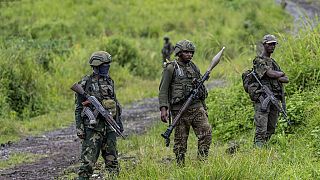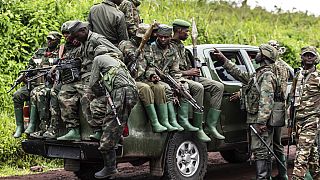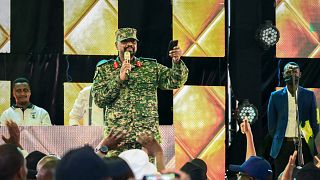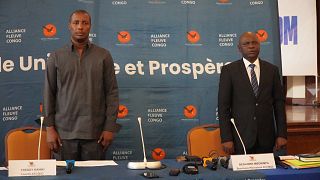Democratic Republic Of Congo
The locality of Komanda in eastern DRC is a destination for those fleeing the violence in the region.
Despair is growing on the back of violent horrors experienced amid a feeling of abandonment for many here.
60-year-old Henriette Lokafu fled her home one night in April 2021, the ADF terrorists had attacked.
"When we were forced to flee, we abandoned everything. We left everything and then they set fire to all the houses. And that day, they killed 4 people, including my sister, two men and another woman. They chased them into the bush and killed them there."
The ADF has been wreaking havoc since the 1990s in the north of the country's neighbouring province of North Kivu but has in recent years spread its tentacles to Ituri as it affiliated to the Islamic State group.
The organization's fighters are not the only ones wreaking havoc and committing atrocities. A shoal of local militias are also infamous for their barbarity -- one such group being Codeco (Cooperative for the Development of Congo), which is accused of killing at least 15 people last month in a fishing camp.
Clashes between militias between 1999 and 2003 left thousands dead in Ituri and, after a decade of calm, the unrest resumed in 2017, increasing humanitarian needs the UN humanitarian coordinator in DRC, regrets.
"In Ituri overall, there are 1.7 million people actually who are displaced, uprooted from their from their areas of origin, which is 39% of the population of the province. It's a stunning number. It's huge. 4 people out of 10 are displaced in the province of Ituri."
"This humanitarian crisis has been going on for 25 years in the DRC. It's one of the world's most serious, most complex and longest -- but also most neglected," Lemarquis told AFP.
"No food, no medicine, nothing"
"We are suffering hugely. Under these tarpaulins, we have no medicine, no food, nothing. The authorities have to know that we exist!" said Christine Dida, a mother of eight, who fled Djugu territory three years ago.
Bahati Letakamba, who has nine children, has also spent three years in Komanda.
"We have to make do and work in native fields to live," he said, gesturing to a little cassava flour left over to feed his family.
The locality of Komanda hosts around 40,000 displaced people. Many have criticised the government for not coming to their aid.
The provincial govenor says authorities do their best with their 'limited resources".
"Right now the government is helping [...] but there is an imbalance so we all have this problem over there and so it's quite true that recently, there hasn't been a certain regularity but as much as the United Nations has given a lot of aid, the government has also given aid.".
Lemarquis said humanitarian groups are doing all they can but that their response plan is "for the time being less than 30 percent funded", leading him to call on the international community to mobilise.
Over the past year, humanitarian needs have risen still further "owing to new conflicts or the resurgence of others", according to Lemarquis, such as the M23 rebellion in North Kivu.
Soldiers moved out from neighbouring provinces, including Ituri, to intervene there and this created a "security vacuum that other armed groups rushed into," said Lemarquis.
Overall, the DRC has more than six million internally displaced people, mainly concentrated in Ituri, North and South Kivu.
The UN Office for Humanitarian Coordination says that of $2.25 billion required to help them, only $747 million was available as of August 16.












Go to video
ICC warns of a dire humanitarian crisis in Sudan as the war rages on
01:01
Trial of DRC's former Justice Minister Constant Mutamba postponed for two weeks
01:00
Pix of the Day: July 3, 2025
01:25
UN humanitarian chief visits families in North Kivu displaced by M23 rebels
01:08
DRC extends ban on cobalt export for another three months
00:08
Vatican beatifies Congolese customs worker killed in 2007 for refusing bribe